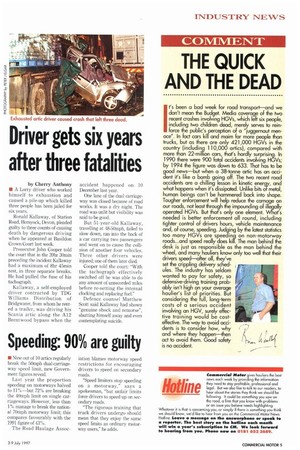THE QUICK AND THE DEAD
Page 7

If you've noticed an error in this article please click here to report it so we can fix it.
It's been a bad week for road transport—and we don't mean the Budget. Media coverage of the two recent crashes involving HGVs, which left six people, including two children dead, merely serves to reinforce the public's perception of a "juggernaut menace". In fact cars kill and maim far more people than trucks, but as there are only 421,000 HGVs in the country (including 110,000 artics), compared with more than 22-million cars, that's hardly surprising. In 1990 there were 900 fatal accidents involving HGVs; by 1994 the figure was down to 633. That has to be good news—but when a 38-tonne artic has an accident it's like a bomb going off. The two recent road accidents are a chilling lesson in kinetic energy, and what happens when it's dissipated. Unlike bits oF metal, human beings can't be hammered back into shape. Tougher enforcement will help reduce the carnage on our roads, not least through the impounding of illegally operated HGVs. But that's only one element. What's needed is better enforcement all round, including tighter control of drivers hours, vehicle maintenance and, of course, speeding. Judging by the latest statistics too many HGVs are speeding on non-motorway roads.. and speed really does kill. The man behind the desk is just as responsible as the man behind the wheel, and many hauliers know only too well that their drivers speed—after all, they've set the crippling delivery schedules. The industry has seldom wanted to pay for safety, so defensive-driving training probably isn't high on your average haulier's list of priorities. But considering the full, long-term costs of a serious accident involving an HGV, surely effective training would be costeffective. The way to avoid accidents is to consider how, why and where they happen—then act to avoid them. Good safety is no accident.








































































































